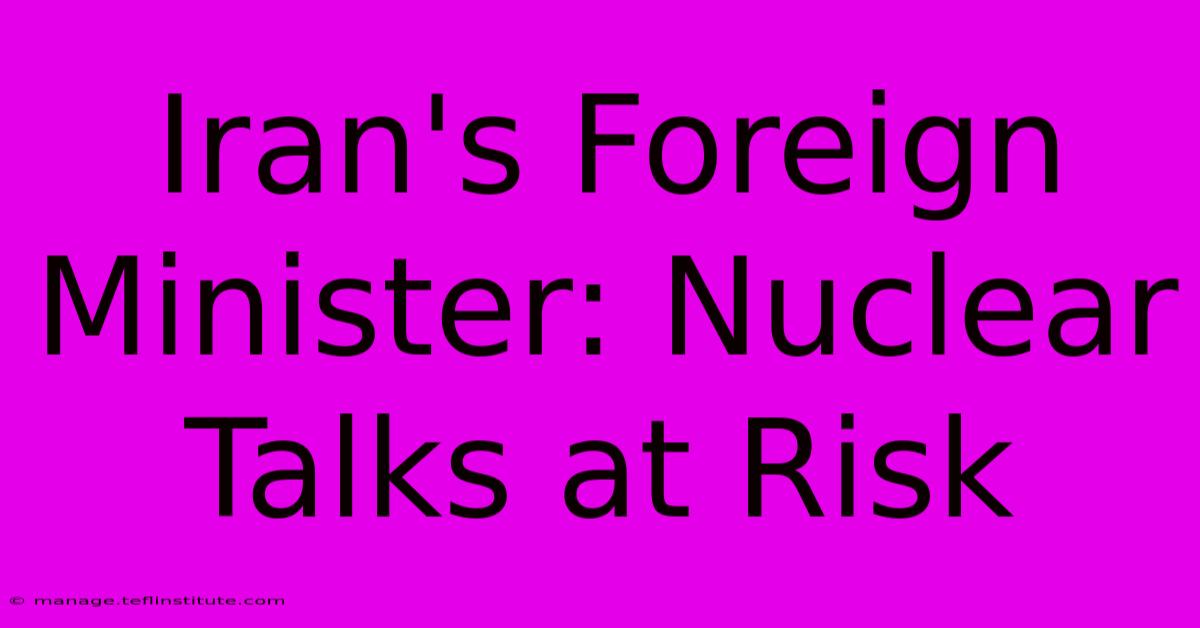Iran's Foreign Minister: Nuclear Talks At Risk

Table of Contents
Iran's Foreign Minister: Nuclear Talks at Risk – A Looming Impasse?
Iran's Foreign Minister Hossein Amir-Abdollahian recently issued a stark warning, asserting that the stalled nuclear talks are teetering on the brink of collapse. His comments, delivered amidst a backdrop of escalating tensions and shifting geopolitical dynamics, highlight the fragility of the negotiations and the potential for a significant regional and international security crisis.
The talks, aimed at reviving the 2015 Iran nuclear deal (JCPOA), formally known as the Joint Comprehensive Plan of Action, have been plagued by delays and disagreements for months. The JCPOA, which limited Iran's uranium enrichment program in exchange for sanctions relief, unravelled after the United States withdrew from the agreement under the Trump administration in 2018. Subsequent attempts to renegotiate have yielded little progress.
Amir-Abdollahian's concerns center on several key sticking points. He accuses the West, particularly the United States, of failing to provide sufficient guarantees that future administrations won't unilaterally abandon the deal again, undermining Iran's trust and willingness to compromise. This lack of "reliable guarantees," he argues, renders any agreement inherently unstable. Furthermore, Iran insists on the removal of all sanctions imposed since the US withdrawal, a demand the West considers overly broad.
The issue of Iran's ballistic missile program and its regional activities also continues to be a point of contention. While the JCPOA doesn't directly address these concerns, Western powers view Iran's military capabilities and regional influence as destabilizing factors, demanding assurances about their future trajectory. Iran, however, firmly rejects linking these issues to the nuclear negotiations, maintaining they fall outside the scope of the JCPOA.
The timing of Amir-Abdollahian's warning is significant. It comes at a moment of heightened regional instability, marked by ongoing conflicts in Yemen and Syria, as well as increased tensions with Israel. This volatile environment casts a long shadow over the negotiations, making compromise even more difficult to achieve. Furthermore, internal political pressures within Iran, particularly from hardline factions opposed to any concessions on the nuclear program, further complicate the path to an agreement.
The potential consequences of the talks' failure are far-reaching. A collapse could lead to a renewed escalation of Iran's nuclear program, raising the specter of a nuclear-armed Iran. This, in turn, could trigger a regional arms race, further destabilizing the Middle East. The potential for military conflict, though not imminent, significantly increases in such a scenario. Economically, the continued sanctions would severely hamper Iran's development and exacerbate its already struggling economy.
While the possibility of a breakthrough remains, the current trajectory points towards a looming impasse. Both sides need to demonstrate a willingness to compromise and address each other's legitimate concerns. The international community has a vital role to play in facilitating dialogue and encouraging a return to the negotiating table. However, the lack of trust and the escalating tensions suggest that the path to a renewed agreement is fraught with considerable challenges and the risk of failure is very real. The coming weeks and months will be crucial in determining whether diplomacy can prevail or if the region is heading towards a dangerous new era of confrontation.

Thank you for visiting our website wich cover about Iran's Foreign Minister: Nuclear Talks At Risk. We hope the information provided has been useful to you. Feel free to contact us if you have any questions or need further assistance. See you next time and dont miss to bookmark.
Featured Posts
-
Ramirez Vs Barboza Jr Fight Preview
Nov 17, 2024
-
Germany Vs Bosnia Live Stream Free
Nov 17, 2024
-
Nuclear Sites Iaea Chiefs Iran Trip
Nov 17, 2024
-
Edinburgh Freeze When Will It Hit
Nov 17, 2024
Latest Posts
-
Energy Secretary Wright In The Running
Nov 17, 2024
-
Trump Taps Wright For Energy
Nov 17, 2024
-
Trumps Energy Choice Wright
Nov 17, 2024
-
Trump Taps Oil Boss For Energy
Nov 17, 2024
-
Oil Exec Wright Joins Trump Team
Nov 17, 2024
-
Chris Wright Hamms Energy Secretary Pick
Nov 17, 2024
